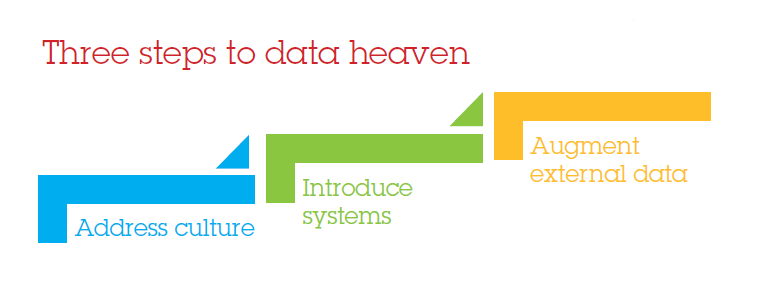In today’s data-rich landscape, private equity firms, financiers and insurers who already collect vast quantities of information can use it to gain a competitive advantage.
Why commission an external organisation to uncover new opportunities when you should already have the information that you need sitting within your own data?
For businesses in the finance and insurance markets calculating, measuring and mitigating risk can be the difference between unrivalled success, and a catastrophic failure. Businesses now, more than ever, are turning to data and analytics solutions to inform the decision-making progress
Three steps to data heaven
After consulting with experts from across the industry, we identified three steps companies can take to get the most out of their data:

Address culture
Any change in culture – including that related to data strategy – must come from the top and requires collaboration and support from across the organisation in order to be successful. It’s important to make the benefits of change clear and have an immediate practical application, such as fraud detection.
Ensure that any data used is handled ethically and that security measures are in place, particularly when using personal customer information.
Introduce systems
It’s not unusual for companies to find that they have information stored in multiple data sources, including ERP systems, CRM systems and proprietary business specific systems. One way to maximise the use of this data is to pull information from multiple systems into one central repository, making data available to those who need to use it. It may also be beneficial to introduce new processes, so that employees know what kind of data should be stored where and how to go about logging it. Digitisation of processes with platforms such as PowerApps can be essential to this.
Additionally, machine learning as a way of managing data is becoming increasingly popular. Building a reliable Machine Learning-based process takes time, but the benefits far outweigh the temptation to do nothing. Firms that begin the process can look forward to using predictive analytics that will alert them to issues within their portfolio and highlight opportunities to grow – offering a far more scientific way to model the future of your business than notes taken in a meeting. Cloud computing has made machine learning much more accessible. Prior to this, it was available only to those only with the biggest budgets who able to invest in the specialist hardware and skillset required to get the job done.
Augment external data
Third-party data – “information that’s collected by an entity that doesn’t have a direct relationship with consumers” (Digiday) – can bring additional insights to your business. However, you should set out clearly how this data will fit into your existing work and the value you expect to gain from it.
In the commercial world interesting insights emerge from external data apps that help create a richer picture.
For example, when creating an insurance quote for business premises, brokers can now evaluate risk imposed by activity from neighbouring properties. It is helpful to know whether your client is setting up shop next door to someone who holds high volumes of flammable materials or could be a prime target for theft.
Telematics specialist secures fleets and delivers safer drivers
The telematics market has evolved rapidly in a very short space of time. Organisations that began with services to help multi-drop delivery drivers to plan their routes have evolved into major players in the insurance services sector.
One such organisation has worked with Coeo to morph its multi-drop solution into a vehicle loss tracking service. Using discreetely placed devices, the organisation tracks and monitors each vehicle within a fleet; receiving an immediate alert should theft occur.
This, coupled with GPS co-ordinates, allows them to pinpoint when and where a theft occurs and where a vehicle is being taken. This organisation can then bring in local authorities and specialist repatriation services – preventing the vehicle from crossing borders and potentially leading to the capture of criminals.
This approach has two benefits for customers - peace of mind that their vehicles are being closely monitored, and reduced insurance premiums.
Data is crucial for modern insurers
Read more with our blog on the importance of data visualisation to the insurance industry or discover seven keys ways to achieve data mastery with our exclusive whitepaper.

